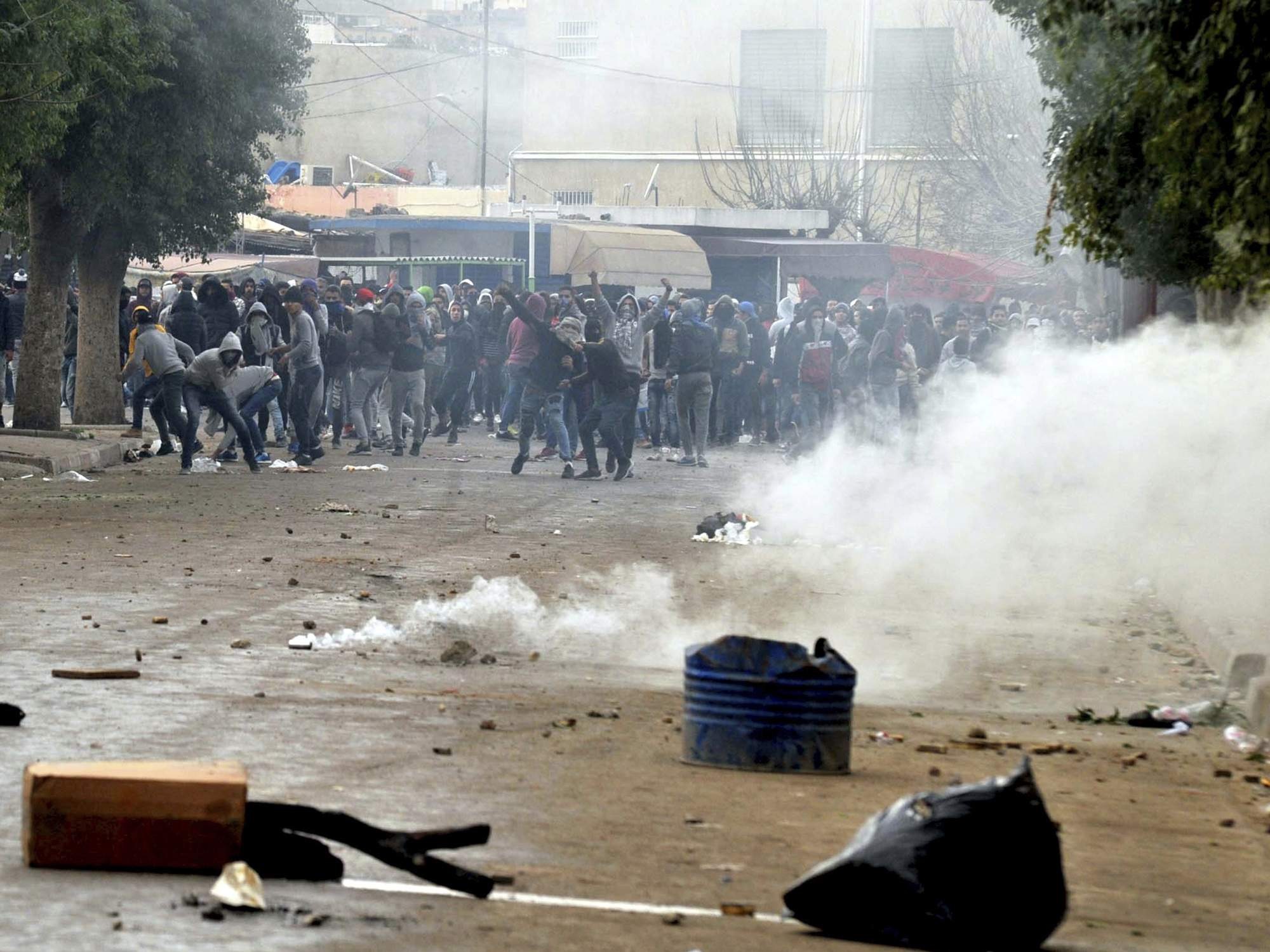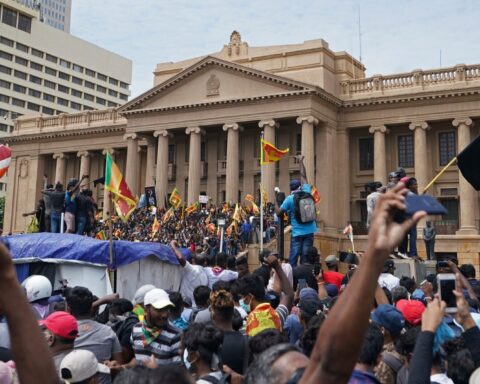By Fathi Chamkhi | Amandla! magazine Issue 57 | 6 July 2018
Seven years after the revolution of 2011, which toppled the dictator, Tunisia is going from bad to worse! All key economic and social indicators are at their lowest levels. The economy continues to idle, fueling the crisis in all sectors. Deficits and underperformance are beating all previous records. The index of industrial activity, the budget deficit, the government debt ratio, the trade deficit, the current account deficit and foreign exchange reserves are at alarming levels. The local currency (the dinar) has lost more than half of its value against the euro and the dollar, and inflation is breaking records.
This economic crisis, the longest and most serious in the country’s contemporary history, feeds the corruption that is becoming a pandemic. It is creating favorable conditions for the spread of smuggling and criminal activity.
The crisis is also hitting the working classes very hard. The most terrible manifestations of the social crisis are above all high levels of unemployment and underemployment and a continuous erosion of the purchasing power of wage earners and of the labouring classes in general. The processes of impoverishment, marginalisation and social exclusion are in full swing.
Tunisia experienced nearly a quarter of a century of a regime that combined political repression with policies of neoliberal capitalist economic and social restructuring. Now the country is torn between two sets of interests: on the one hand the legitimate economic and social demands of the working classes, after the revolution. On the other hand, neocolonial capitalist interests.
Continuing imperialist dictatorship
Imperialist control of Tunisia is today at its strongest since the end of the colonial era. The main imperialist states and the international financial institutions exert a real dictatorship over the country. Despite a victorious revolutionary social uprising, the labouring classes and youth have failed to reorient the country in the right direction. Tunisia continues to be forced to walk in the wrong direction, that of neocolonialist economic interests.
Over the last thirty years, the key words in the vocabulary of colonialism in Tunisia have been ‘free trade’, ‘structural reforms’ and ‘austerity’. Once the shockwave of the revolutionary insurrection was over, the counter-revolutionary forces managed to reinforce their political control of the country. They were helped by the weakness of social consciousness among the exploited classes, their lack of political experience and the inadequacy of their self-organisation.
On two occasions, in 2013 and 2016, the government concluded an agreement for the extension, strengthening and acceleration of structural adjustment programs and fiscal austerity measures.
Structural adjustment programmes are based on loans from the International Monetary Fund ((IMF) and World Ban. These loans are given on strict conditions which include privatisation, deregulation and austerity.
This powerful neocolonial takeover was promoted, in particular, by the crisis of public finances, the decline of economic activity, and the absence of an alternative social agenda enjoying broad social support.
The pace of austerity hots up
The current government, headed by Y. Chahed (YC), in place since August 2016, was yet another attempt to stop Tunisia’s downward spiral. YC began his mandate by acknowledging the seriousness of the crisis, but affirming that the only remedy was to pursue the same policy while accelerating the pace of structural reforms.
A promise is a promise! After a chaotic first year, YC decided to take the bull by the horns and put forward a battery of anti-social measures through the 2018 Finance Act. These include tax measures such as an increase in the rate of VAT and taxes or customs duties on various products and services. A new spike in prices followed. Inflation is up from 3.8% in August 2016 to 7.1% today!
Among the new measures is the introduction of a new 1% tax on income, called “social solidarity participation.” At the same time, other new measures have been designed to lower state subsidies on certain basic foodstuffs.
With these measures, YC knows that he is entering a minefield! Not only because of their unpopularity, but also because of the extent of the criticism coming from everywhere against this government and its very disappointing record. The critics come not only from the opposition but also from within the ruling coalition, and even his own party.
Trying to justify austerity
This is why the YC government has been careful to spread the application of its measures throughout the current year, in order to reduce the risks of a new social explosion. He has also made great efforts at communication, to try to justify them.
YC and his ministers often refer to the negative balance sheet they inherited from previous governments. They also invoke the sacrifices they have to impose so that the country can emerge from the crisis and achieve an economic recovery. But the recovery is slow in coming. Finally, YC and his ministers, running out of stories to reassure Tunisians in the face of the dramatic deterioration of their living conditions, are predicting an early end to their sacrifices. He claims that 2018 will be the last year of the crisis, and that 2019 will see Tunisia emerge from the long tunnel of the crisis and return to growth.
Resistance grows
But it’s a wasted effort! The seriousness and persistence of the economic crisis, the scale of the social disaster and, above all, the long list of unfulfilled promises of a “better tomorrow” have been too much even for the patience of Tunisians, leaving room only for feelings of bitterness and anger.
During the week of January 8, the country experienced new unrest in response to the anti-social measures contained in the 2018 Finance Act. There was a week of protest and sometimes very violent clashes with the police. Among the demonstrators, one died, there were a thousand arrests and more than one hundred wounded on both sides (demonstrators and police). A precarious calm prevails again across the country. The worsening social crisis continues to fuel frustrations and discontent among large sections of the population. At any time, the anger can resurface.
The latest social explosion has strongly challenged a government that is running out of steam, increasingly abandoned by its political allies, and overtaken by its failure to cope with the country’s dramatic situation.
Indeed, the YC government seems to be on hold and its days are numbered. It is cracking from within. The internal dissension is no longer a secret to anyone. The few supporters who remain loyal to YC are the Islamist party Ennahdha, whose support is purely opportunistic, and the leadership of the all-powerful UGTT trade union centre, whose secretary general finds nothing better to say than that Tunisia has had enough of the repeated changes of government. But this support is short-lived, because within the executive of the UGTT the tone is more and more threatening. In addition, the strike movements in important sectors such as education and the public service are becoming more and more militant. Added to this is a strike by young doctors and medical students that has lasted more than a fortnight. There is also the total shutdown, lasting about twenty days, of activities related to the extraction and processing of phosphate.
Over the last thirty years, the working classes have gone through several states as they cope with the multiple and continuous social assaults from a decadent capitalist regime. The Tunisian working classes have experienced everything, or almost:
– from resignation at political oppression to revolutionary insurrection,
– from democratic elections to manipulation by regressive and counter-revolutionary forces.
But far from weakening the determination and combativity of the working classes, these experiences have been beneficial to them in terms of political education and growth in awareness of their interests as dominated and exploited classes. The revolutionary insurrection of 2011 opened the way for social change in Tunisia. This road of social and national relief is a sinuous one, strewn with pitfalls. Nothing seems to indicate today that these classes will stop midway. The weeks and months ahead are rich with positive promises.
____________________________________________________
Fathi Chamkhi is a Member of the Assembly of People’s Representatives and a Member of the Central Council of the Popular Front.
Translated from the original French by Richard Fidler, a Canadian activist who blogs at http://lifeonleft.blogspot.co.za/
source: http://aidc.org.za/tunisians-rise-up-against-austerity/









